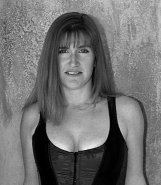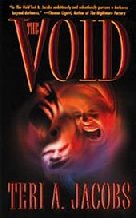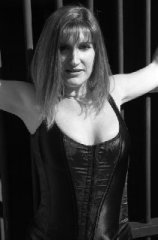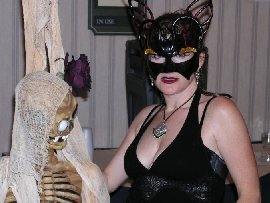
Teri A. Jacobs' fiction has graced the pages of many a magazine and anthology. She took the novel market by storm with her first book The Void, available from Leisure. Here Terror Tales is proud to present Paul Kane's exclusive interview with the dark lady of horror herself… ...
Paul Kane: How did you get into writing and why did you choose horror?
Teri A. Jacobs: Writing proved the less disruptive expression of my imagination. Before I learned how to write and pen a tale, I would enact them in 'plays', which sometimes involved some hair-raising and hair-pulling plots. Horror chose me, I suspect. It nurtured me in my formative years, during all those late nights when I camped with my dad and brother on the couch, awash in the silver light of the television, enraptured with Dracula, Frankenstein, the Wolfman and Mummy, the Blob and all their brides and sons and daughters of darkness. But Edgar Allen Poe clinched my love of the grim and eerie and inspired me to write horror of my own. Because it's so much better, more challenging, to elicit a shiver of dread through atmosphere than a scream from having pulled out hair.

Paul Kane: Your first published story was 'Why Me' at the age of 13. Could you tell us what it was about?
Teri A. Jacobs: Something very horrible - teenage angst. Yes, I wrote a story about a girl riddled with confusion and ostracised by her peers for being different. It might not have been genre fiction, but it instilled a character pattern in much of my work: empowering the misfit as hero.
Paul Kane: You've already mentioned Edgar Allen Poe as one of your favourite writers. Which other writers old or new do you admire, and what kind of horror - new or traditional - do you prefer?
Teri A. Jacobs: Due to the sheer number of writers I admire, I will limit myself to the top five. Old: William Shakespeare, John Milton, Geoffrey Chaucer, H.P. Lovecraft, Oscar Wilde. New: Clive Barker, Thomas Ligotti, Stephen King, Robert McCammon, Charlee Jacob. I prefer supernatural horror written in any style (traditional, literary, edgy, etc) as long as the story engages me. Of course I prefer long books like The Stand, Weaveworld, and Swan Song, where I am carried away into other realms of existence.
Paul Kane: What's your main motivation for writing, and has this changed over the years?
Teri A. Jacobs: My main motivation for writing is purging my mind, loosing my imagination. Lest all the imagery and ideas in my head expand and explode my skull, splattering gory hieroglyphics on the walls for scientists to decipher. Again, writing is simply a less disruptive means of expression. Nothing will change this.
Paul Kane: Do you have a writing schedule or do you just write when you feel like it? And what's your favourite time of day for writing?
Teri A. Jacobs: I follow a writing schedule - three and a half hours every weekday morning and eight hours on Saturdays. But my favourite time of the day for writing is in the early afternoon, probably because I've stuffed my belly with food and feel more alert, more creative, less likely to leave the keyboard in search of a snack.

Paul Kane: Your interest in South American mythology influenced the writing of The Void. Do you have any plans to do more stories or novels based on mythologies from other cultures?
Teri A. Jacobs: I explored Phoenician, Caananite, Judaic, and Christian mythologies/beliefs in my second novel (which is in title 'dispute') - bringing to life the Grigori, a sect of fallen angels, who have escaped their prison in heaven to repopulate the earth with their sons, a race of ravenous giants, as well as Lilith, Ba'al, Asherah, and the Archangels and a slew of other heavenly hosts. In The Art, I plan on touching upon the legends of asparas, dakinis, succubi, and other fanciful 'ladies'. The world of myth offers such bounteous veins to be tapped, and I'll happily continue bleeding it!
Paul Kane: I was blown away by the descriptive prose and imagery in The Void. Is this something you've worked at to refine or does it come naturally for you? Do you simply describe what's in your mind's eye?
Teri A. Jacobs: Thank you for your appreciation, I'm tickled to death! My style, which admittedly is purple (livid like a bruise) stems from my early writing years, when teachers would lavishly praise descriptive work. Like Pavlov's dog, I responded to reward and honed the skill for more reward. I view style as art: some artists believe in simple lines and straightforward images; whereas others believe in ambiguity and surrealism, with attention to strange combinations of colours and flourishing brush details. At the moment, for my third book, I intend to marry the styles and produce something rich yet simple. I create from imagery rather than talking-heads or action in my head. Perhaps this drives my work to be more colourful, descriptive, because I'm struggling to put a 'painting' into words.

Paul Kane: You've had work published in the UK as well as the USA. Do you have any opinions as to why horror seems to be thriving over in America now while in Britain we're still going through a bit of a lull.
Teri A. Jacobs: I'm not as market savvy as others, but I think Hollywood, with its surging trends toward the fantastic and thrilling, has resurrected the genre. Publishers probably realised the horror audience still existed; moreover, the audience was hungry, having been starved with rations for so long. America, being the capitalist country, seized the green opportunity. As for the lull in Britain, I can't understand it, considering the slew of great emerging writers hailing from there (China Miéville, Simon Clark, Graham Joyce, etc).
Paul Kane: What direction do you see the genre taking in a few years' time? Do you think it works in cycles and that there will be another big boom as there was in the 70's and 80's?
Teri A. Jacobs: In the near future, I foresee a trend toward subtle, more intelligent and harrowing tales. The public has had its fill of gore and extremities, I believe, especially in the wake of recent tragic events. Classic horror will probably return, as part of that cycle. But I don't think the boom of the 70's and 80's will repeat. The horror label frightens off potential readers - the misconception is that horror is like the movies, all of it hacking and slashing without true substance. That's why many houses have tagged 'thriller' or even just plain 'fiction' on books that are clearly horror. The houses that do print horror don't or can't spend enough money on marketing, on pushing the product onto the consumers. I read an interview with John Saul, and he mentioned his first book became a bestseller because his agent and his publisher decided it sounded like one and then advertised on national TV. When's the last time we've seen an ad for horror, besides Stephen King?
Paul Kane: Do you attend conventions? If so, which have you been to, which were your favourites, and what's the next one you're going to attend?
Teri A. Jacobs: Since 1998, I've attended the World Horror Convention and plan on continuing. I've gone to Horrorfind and Dragon*Con, and Halloween Fest 2 in Florida, where I did a signing session for The Void. Someday I'll make the World Fantasy Convention. But I count the WHC as my con haunt. The event where I hang with my friends and mingle with other dark misfits of like-minds and interests. Nothing else feels like home, like a wonderful madhouse.

Paul Kane: Do you have any advice for other horror writers out there, and in particular women horror writers like yourself?
Teri A. Jacobs: I want to address the latter part of the question first because I don't believe my sex has a bearing on my success or not. Would Mary Shelley's Frankenstein have been more or less of a wonder if she were a man? Would Shirley Jackson's short story 'The Lottery' or her novel The Haunting of Hill House have been more or less than masterpieces if she were a man? I doubt it. The works stand alone, without faces, gender, race or religion, only their quality showing and shining, and the only way a woman, or a man, can succeed as a writer is to write as well as possible with the best idea they've got. In my opinion and advice, besides luck and imagination, a writer needs three things: passion, persistence and perspiration. Penis is optional.
Paul Kane: Exactly the answer I was looking for. Thanks, Teri
Teri A. Jacobs: : Thank you, Paul.
Visit the official Teri A. Jacobs website at
http://terijacobs.darkgriffon.net
Photography © Bob Meyer & Teri A. Jacobs
Interview (C) Paul Kane & Teri A. Jacobs